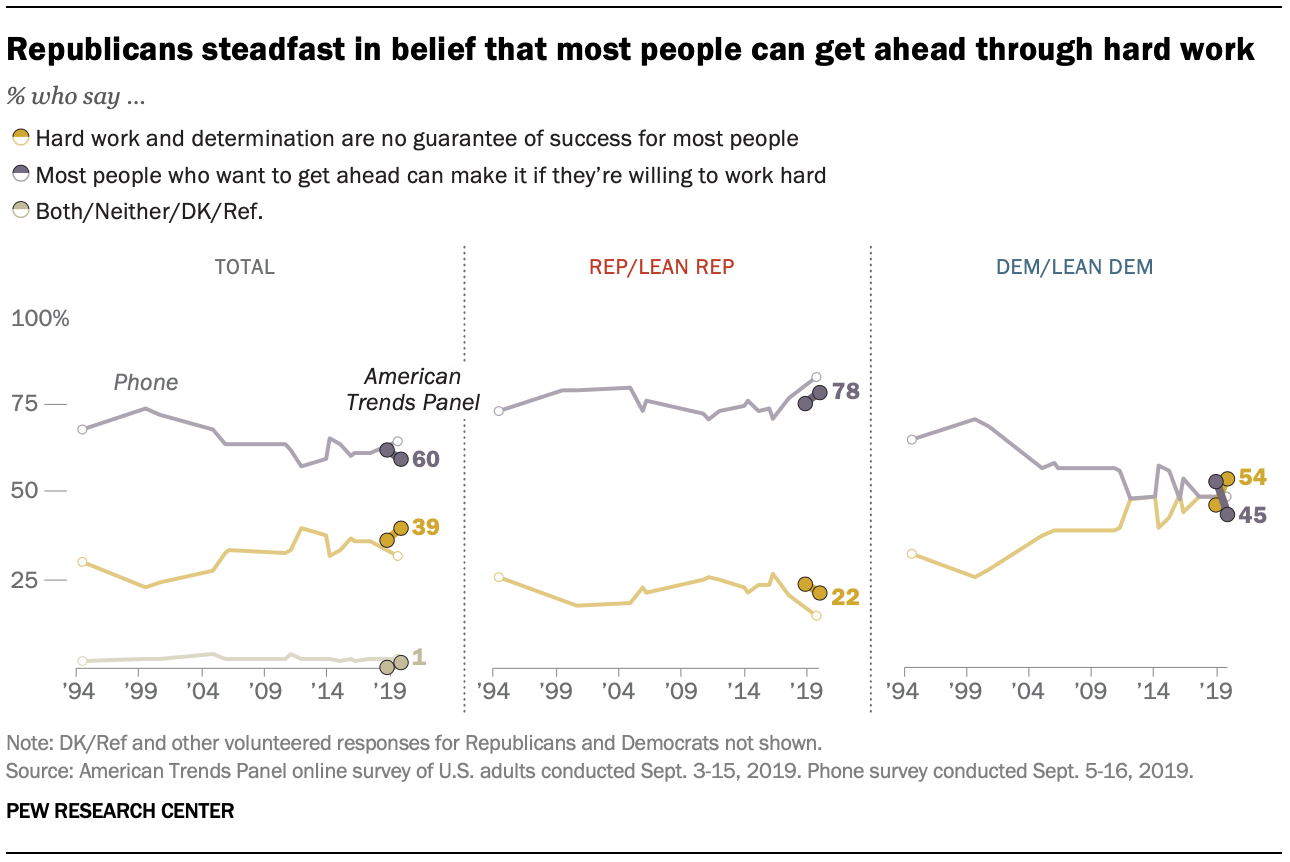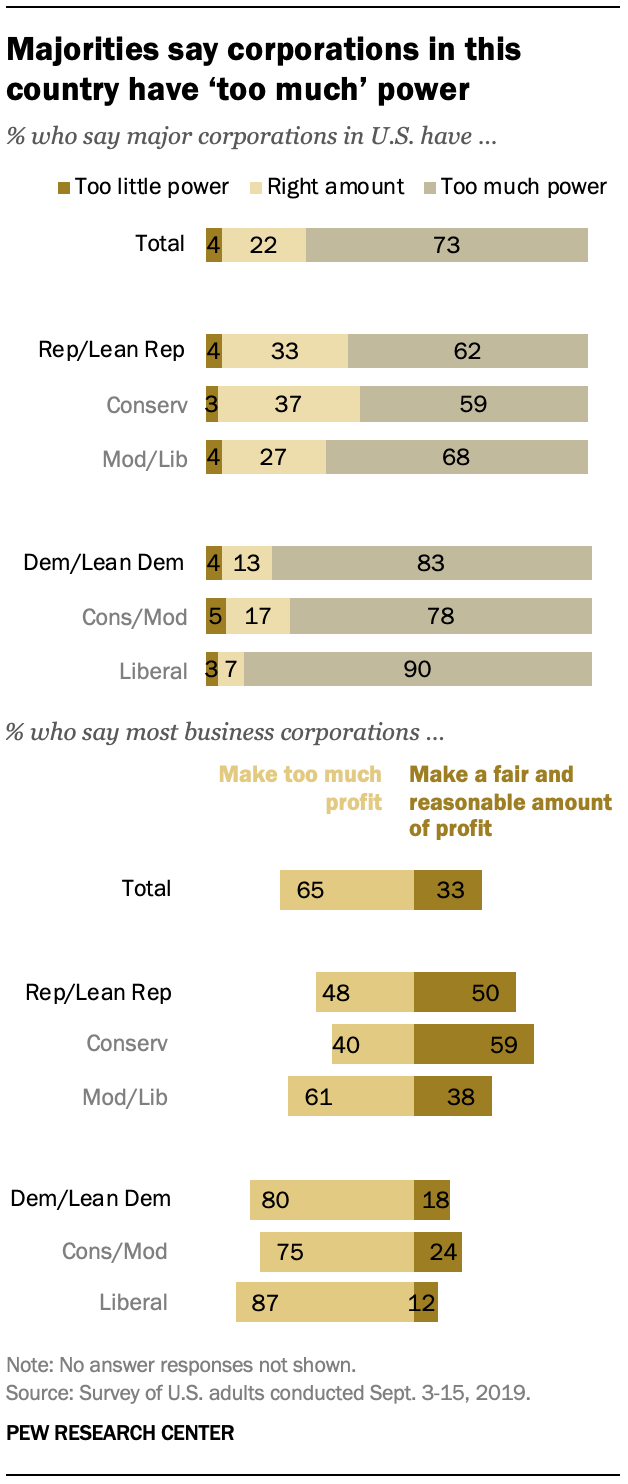
The American public is broadly critical of the power held by major corporations in the United States and the profits made by business corporations.
Nearly three-quarters of U.S. adults (73%) say major corporations in the country have too much power; far fewer (22%) say they have the right amount of power and just 4% say they have too little power.
There is some bipartisan agreement in views of corporate power. A majority of Republicans and Republican-leaning independents (62%) say major corporations in the U.S. have too much power; an even larger majority of Democrats and Democratic leaners (83%) also hold this view.
Liberal Democrats (90%) are somewhat more likely than conservative and moderate Democrats (78%) to say corporations have too much power. Among Republicans, conservatives (59%) are 9 percentage points less likely than moderates and liberals (68%) to view corporations as too powerful.
The public also is critical of the profits made by business corporations: 65% say corporations make too much profit, compared with 33% who say they make a fair and reasonable amount of profit.
Democrats and Democratic leaners overwhelmingly say that most business corporations make too much profit (80%). By contrast, Republicans and Republican leaners are divided in their views: 48% say corporations make too much profit, while about as many (50%) say they make a fair and reasonable amount of profit.
Within the GOP there are significant divides in these views by ideology. Most conservative Republicans (59%) say business corporations make a fair and reasonable amount of profit. Views tilt in the opposite direction among moderate and liberal Republicans: 61% say business corporations make too much profit.
There are more modest differences by ideology among Democrats: 87% of liberals and 75% of conservatives and moderates say most business corporations make too much profit.
Views of corporate power by level of household income
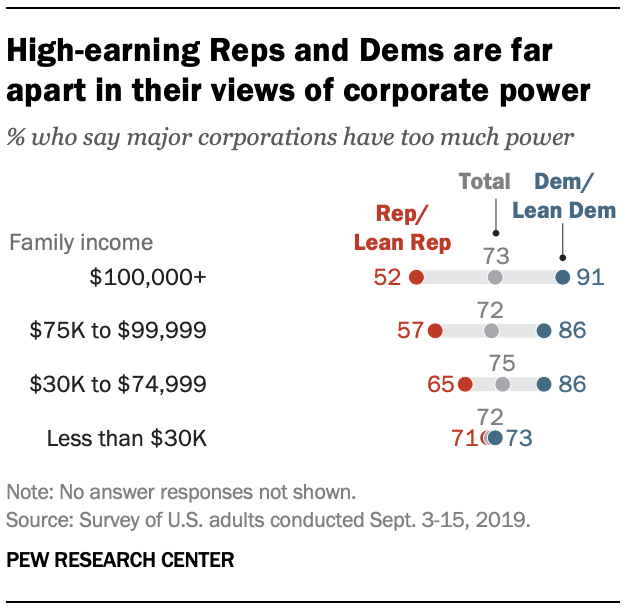
Among the general public, views of corporate power are similar across income levels. For instance, 73% of those with family incomes of $100,000 a year or more and 72% of those earning less than $30,000 a year say major corporations have too much power.
However, there are income differences on this question between Republicans and Democrats, and the respective partisan patterns run in different directions.
Among Republicans and Republican leaners, lower earners are more likely to see corporations as too powerful than higher earners. For instance, 71% of Republicans earning less than $30,000 a year say corporations have too much power, compared with 52% of those earning at least $100,000 a year.
By contrast, Democrats and Democratic leaners with the lowest levels of household income are somewhat less critical of corporate power than those with higher incomes: 73% of Democrats earning less than $30,000 a year say corporations have too much power, compared with roughly nine-in-ten Democrats with incomes of $100,000 or more (91%).
As a result, higher-income Republicans and Democrats are far apart in their views on corporate power, while among lower-income Americans there is little difference between the views of Republicans and Democrats.
Leaders in business and technology get low marks on empathy
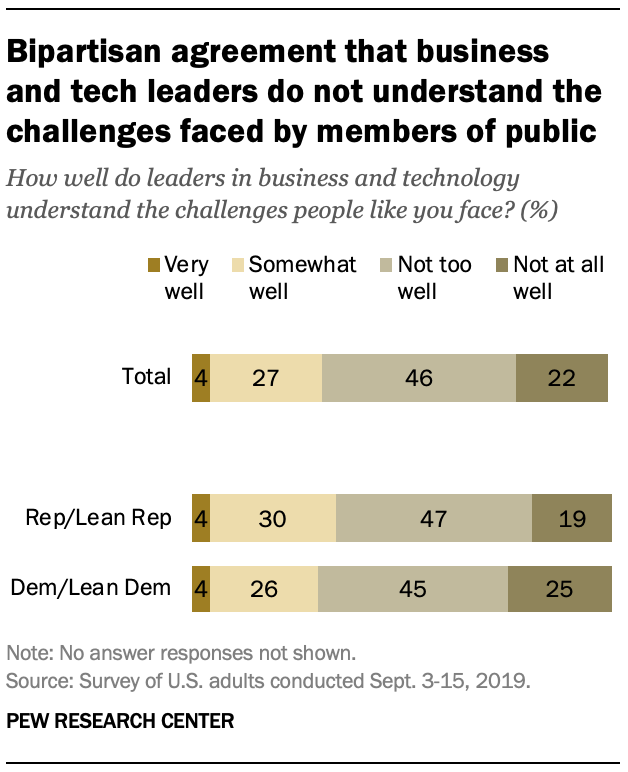
In addition to concerns over corporate power and profits, the public is critical of how well leaders in business and technology understand the needs of everyday people.
Overall, 68% say business and technology leaders understand the needs of people like them either not too well (46%) or not at all well (22%). Just 31% say these leaders understand their needs very (4%) or somewhat well (27%).
Criticism of business and technology leaders on this measure is bipartisan: 71% of Democrats and Democratic leaners and 66% of Republicans and Republican leaners say leaders in technology and business do not understand the challenges they face in their own lives.
Partisan, demographic differences in views of government aid to needy
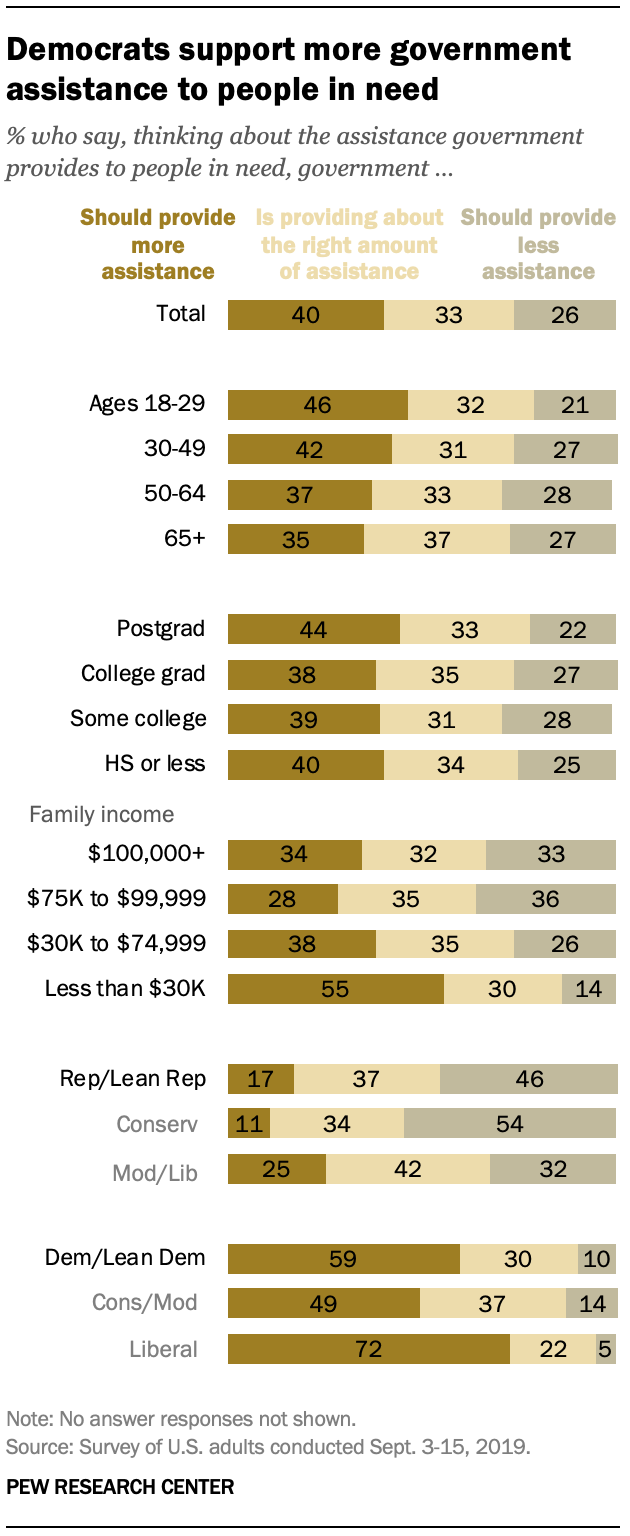
Americans are divided in their views on government aid to poor and needy people, and partisan differences on these questions are among the largest seen in the survey. In addition, level of household income is tied to attitudes on these questions, with those earning less more supportive of government aid.
Overall, 40% say the government should provide more assistance to people in need, while 26% say the government should provide less assistance; 33% say the current level of assistance to people in need is about right.
A majority of Democrats and Democratic leaners (59%) say the government should provide more assistance to people in need. Three-in-ten say the current level of assistance is about right, and just 10% say the government should provide less assistance to people in need. Liberal Democrats (72%) are much more supportive of expanding aid to needy people than are conservative and moderate Democrats (49%)
Republicans and Republican leaners are far less supportive of expanded aid to people in need: 46% say the government should provide less assistance, while 37% say the current level of assistance is about right. Relatively few (17%) say the government should provide more assistance to people in need. Among conservative Republicans, 54% say the government should provide less assistance to people in need; about a third of moderate and liberal Republicans (32%) say the same.
In addition to partisan differences, views on this question diverge by age and level of household income.
Younger adults are more supportive of expanding assistance to people in need than are older adults. For instance, 46% of those ages 18 to 29 support greater government assistance, compared with 35% of those 65 and older.
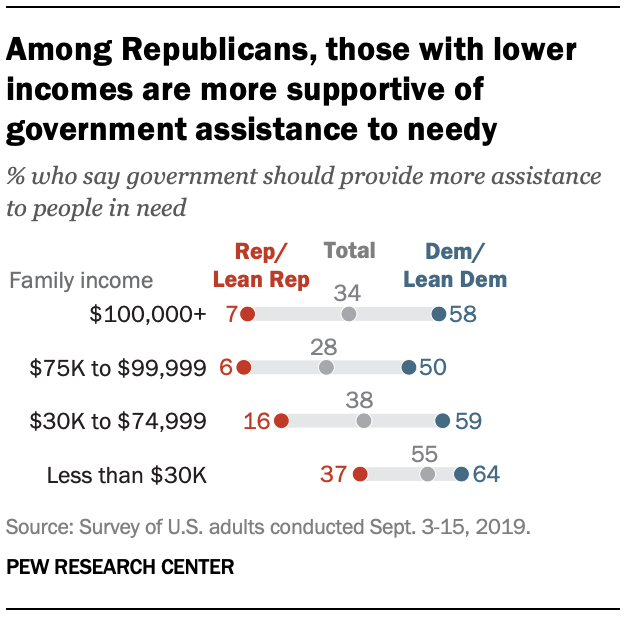
Those with the lowest levels of household income are most supportive of expanding aid to people in need. A majority of those earning less than $30,000 a year (55%) say the government should provide more assistance to people in need. Support is much lower among those with annual household incomes of $30,000-$74,999 (38%), $75,000-$99,999 (28%) and $100,000 or more (34%).
Among Republicans and Republicans leaners, 37% of those earning less than $30,000 a year support greater government assistance to people in need. Among higher-earning Republicans, support for this policy is much more limited.
Among Democrats and Democratic leaners, there is a modest gap in support for more assistance to people in need between the lowest earners (64%) and the highest earners (58%). Half of those with family incomes of $75,000-$99,999 a year support this policy, as do 59% of those making $30,000-$74,999.
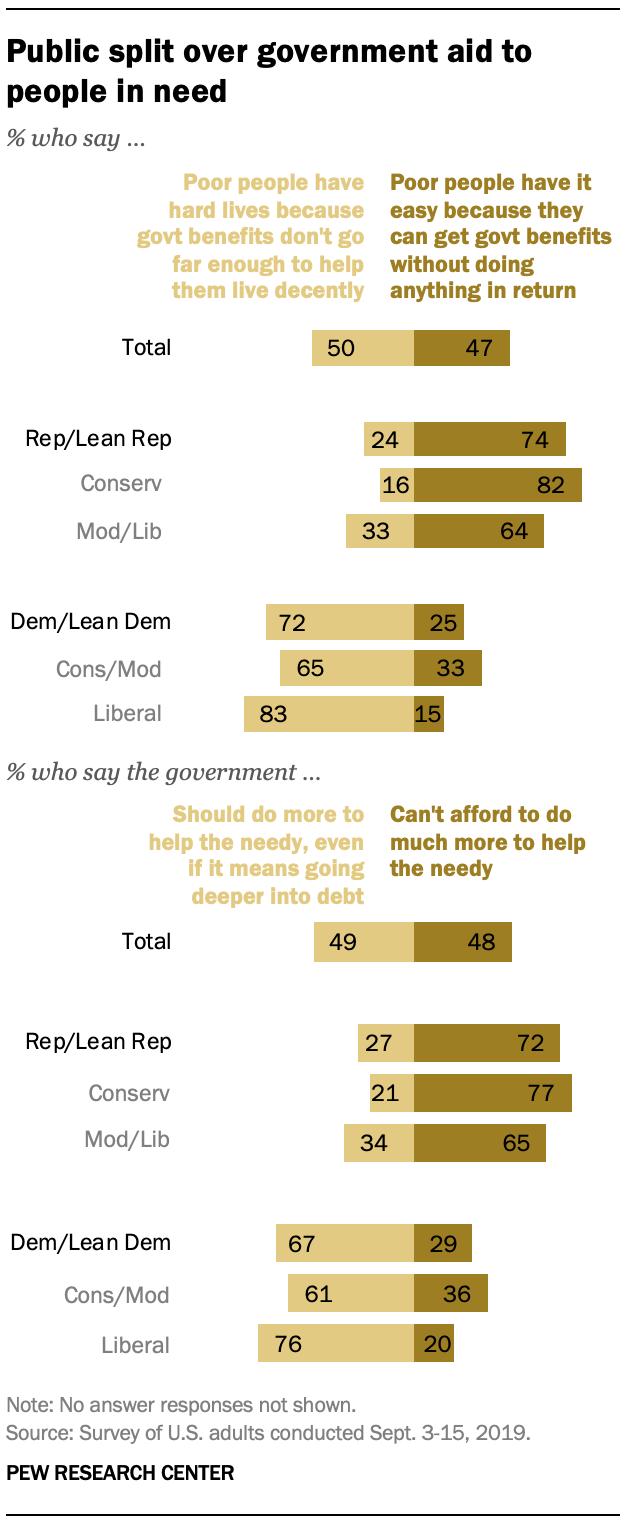
The public is divided on two other questions about the government’s role providing aid to poor and needy people, with Republicans and Democrats holding contrasting views.
When asked which statement comes closer to their views, 50% of Americans say that “poor people have hard lives because government benefits don’t go far enough to help them live decently,” while roughly the same share (47%) say “poor people today have it easy because they can get government benefits without doing anything in return.” About three-quarters of Republicans and Republican leaners (74%) say poor people have it easy because of the government benefits they can receive. A similar share of Democrats and Democratic leaners (72%) say poor people have hard lives because government benefits to do not go far enough.
On a related measure, 49% say the government should do more to help needy Americans, even if it means going deeper into debt, compared with 48% who say the government can’t afford to do much more to help the needy. Here again, partisan differences are stark: 72% of Republicans say the government can’t afford to do much more to help the needy; 67% of Democrats say the government should do more to help the needy, even if it means going deeper into debt.
Views on opportunity and fairness of economic system
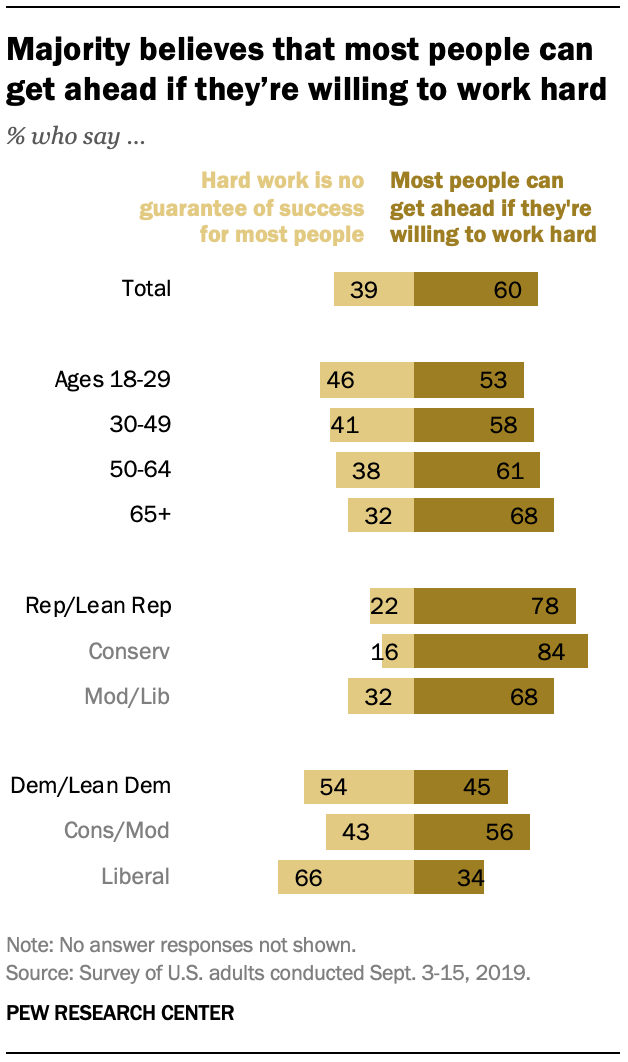
Americans are deeply pessimistic about the fairness of the U.S. economic system. Still, a majority of the public maintains the belief that most people can get ahead through hard work.
Overall, 60% say that most people who want to get ahead can make it if they’re willing to work hard, while 39% say that hard work and determination are no guarantee of success for most people.
The youngest adults are less likely than older adults to say people can get ahead if they’re willing to work hard: 53% of those ages 18 to 29 say this. By comparison, majorities of those ages 30 to 49 (58%), 50 to 64 (61%) and 65 and older (68%) take this view.
Nearly eight-in-ten Republicans and Republican leaners (78%) believe that most people can make it if they’re willing to work hard. Democrats and Democratic leaners are divided: 45% say hard work is enough for most people to get ahead, but 54% say that hard work and determination are no guarantee of success.
By about two-to-one (66% to 34%), liberal Democrats say hard work is no guarantee of success for most people. Among conservative and moderate Democrats, 56% say most people can get ahead through hard work, while 43% say hard work is no guarantee of success.
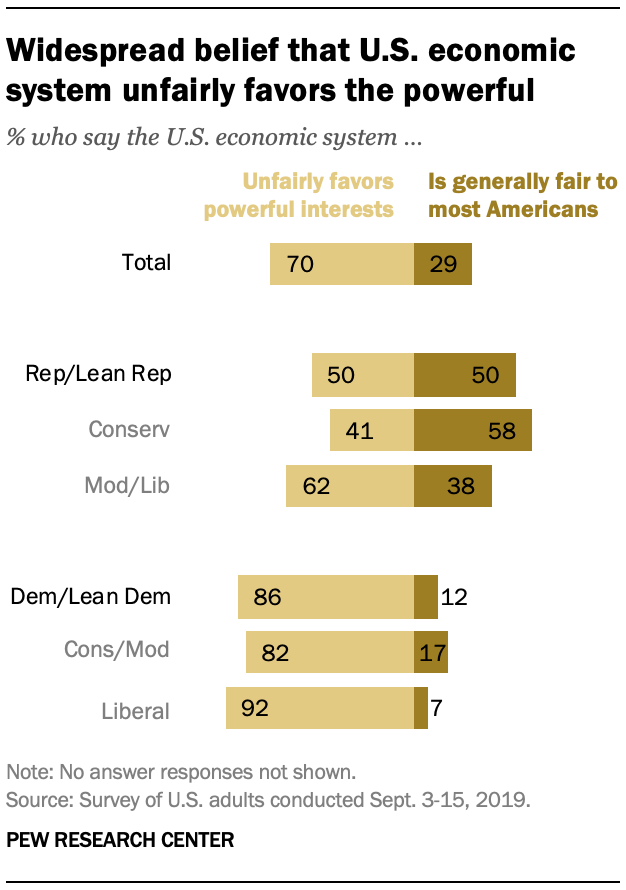
When it comes to views of the U.S. economic system, 70% say the system unfairly favors powerful interests, while just 29% say the economic system in the country today is generally fair to most Americans. A large majority of Democrats (86%) believes the economic system unfairly favors powerful interests. Republicans are evenly split: 50% say it is generally fair to most Americans, and 50% say it unfairly favors powerful interests.
Among Republicans, there are substantial differences on this question by ideology. Most conservative Republicans (58%) say the economic system is generally fair to most Americans. By contrast, 62% of moderate and liberal Republicans say it unfairly favors powerful interests.
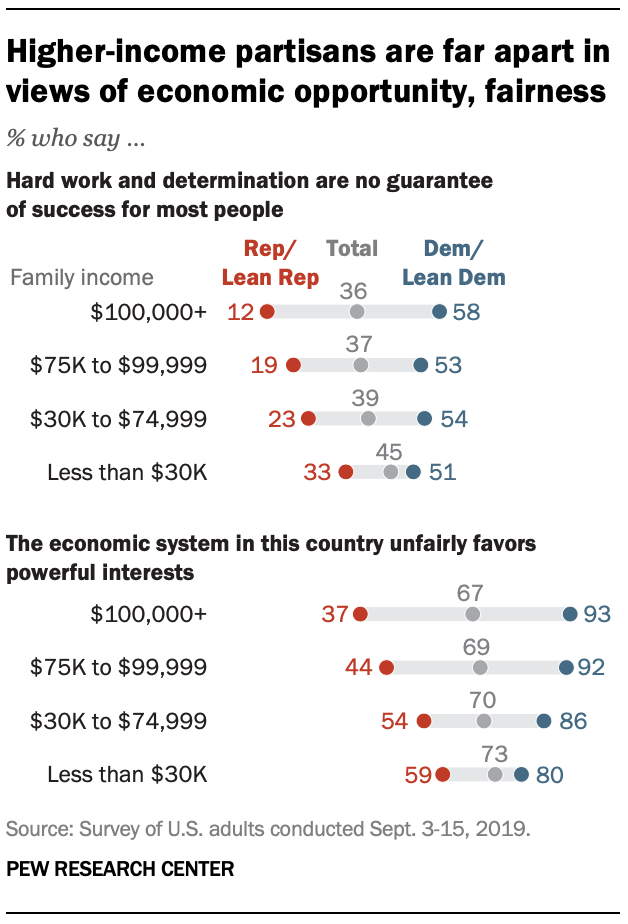
Among Republicans, a majority of those with household incomes of less than $30,000 a year (59%) say the economic system unfairly favors powerful interests. This view is less widely held among higher earners. For instance, fewer than half of Republicans earning $100,000 a year or more (37%) believe the economic system is unfair. Lower-earning Republicans also are more likely than higher earners to say that hard work and determination are no guarantee of success for most people; however, this view remains a minority opinion among Republicans across income levels.
Among Democrats, income differences on these questions are smaller than among Republicans. But to the extent that they do exist, Democrats with lower incomes are somewhat less critical of the economic system and more positive about the ability to succeed through hard work than higher-earning Democrats.
As a result of different dynamics among Republicans and Democrats, overall income differences in views of economic fairness and the relationship between hard work and success are relatively modest. And the partisan gaps on these two questions are much larger among higher-earning Republicans and Democrats than they are among lower-earning partisans.
Long-term opinion trends: Views of the social safety net and nation’s economic system
In recent years, Pew Research Center has transitioned from probability-based telephone surveys to the American Trends Panel, a probability-based online panel. The transition from phone surveys conducted with an interviewer to online self-administered surveys brings with it the possibility of mode differences – differences arising from the method of interviewing.
This section includes opinion measures on views of the social safety net and the U.S. economic system. Several questions on these subjects have long-standing telephone trends and were included on a survey conducted in September on the American Trends Panel (ATP), on which this report is largely based, and a contemporaneous telephone survey. This allows for a comparison of any “mode effects” and places the current panel estimates in the context of telephone data.
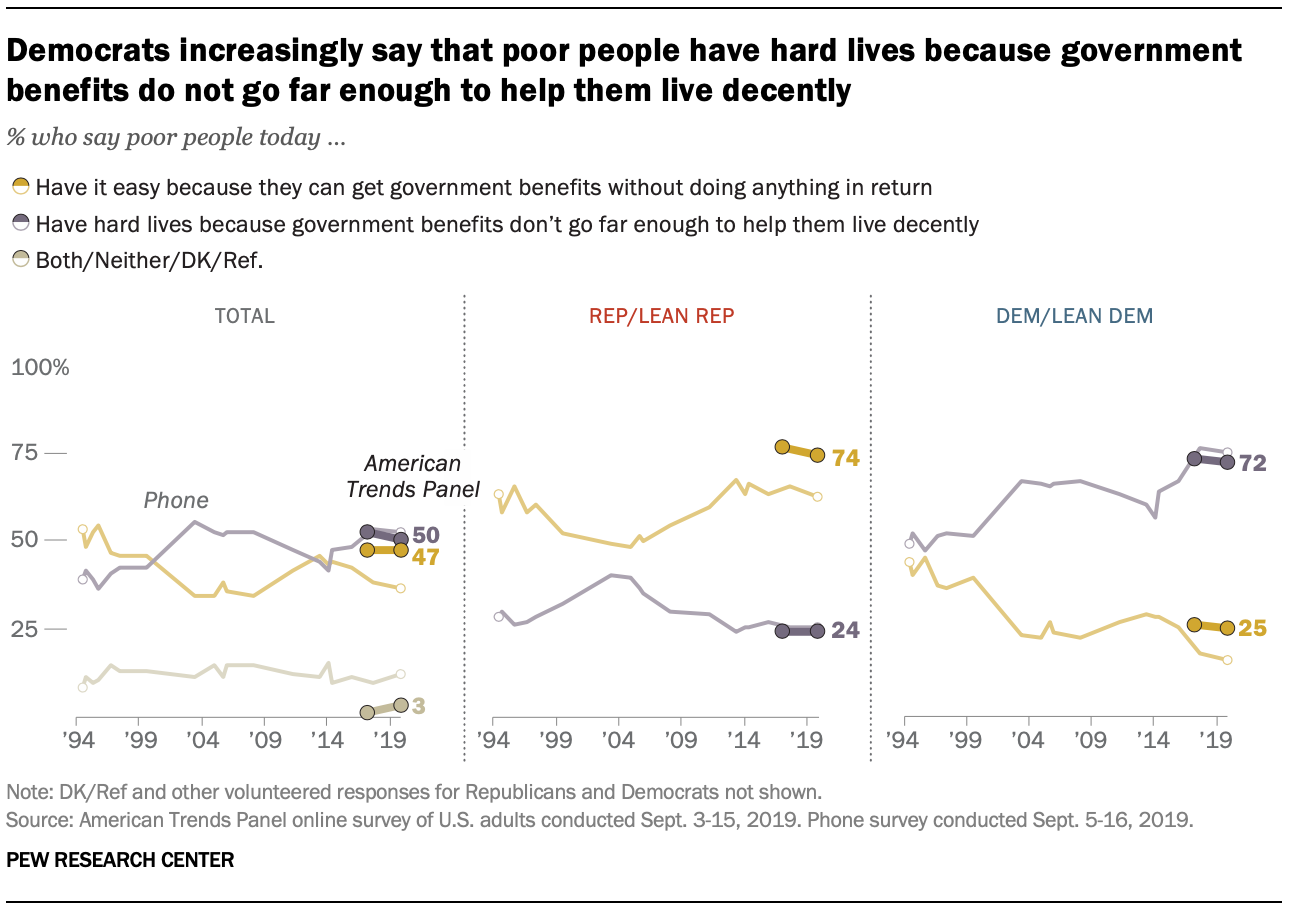
On the American Trends Panel, 50% say poor people have hard lives because government benefits do not go far enough to help them live decently, while 47% say poor people today have it easy because they can get government benefits without doing anything in return. On the telephone survey, 52% say poor people have hard lives, compared with 36% who say they have it easy. As is often the case, the share offering no opinion is much higher on the phone survey (12%) than the online survey (3%).
The partisan gap on this question is very large, in both the phone and panel data. On the ATP, three times as many Democrats and Democratic-leaning independents as Republicans and Republican leaners say the poor have hard lives because government benefits are insufficient to allow them to live decently (72% vs. 24%). The gap between Republicans and Democrats has widened over the past two decades, largely because Democrats increasingly say the poor have hard lives because government benefits do not go far enough.
There also is a striking partisan divide in views of whether or not the government should do more to help the needy, even if it means going deeper into debt. On the American Trends Panel, 49% of the public overall says the government should do more to help the needy, even if this adds to the nation’s debt; 48% say the government can’t afford to do much more to help the needy. On the contemporaneous phone survey, 52% say the government should do more to aid the needy even if it raises the debt, while 40% say the government can’t afford this.
In the online survey, two-thirds of Democrats and Democratic leaners say the country should to more to help the needy, even if it means increasing the debt; just 27% of Republicans and Republican leaners say the same. Partisan differences on this question today are much larger than they were throughout much of the 1990s and 2000s.
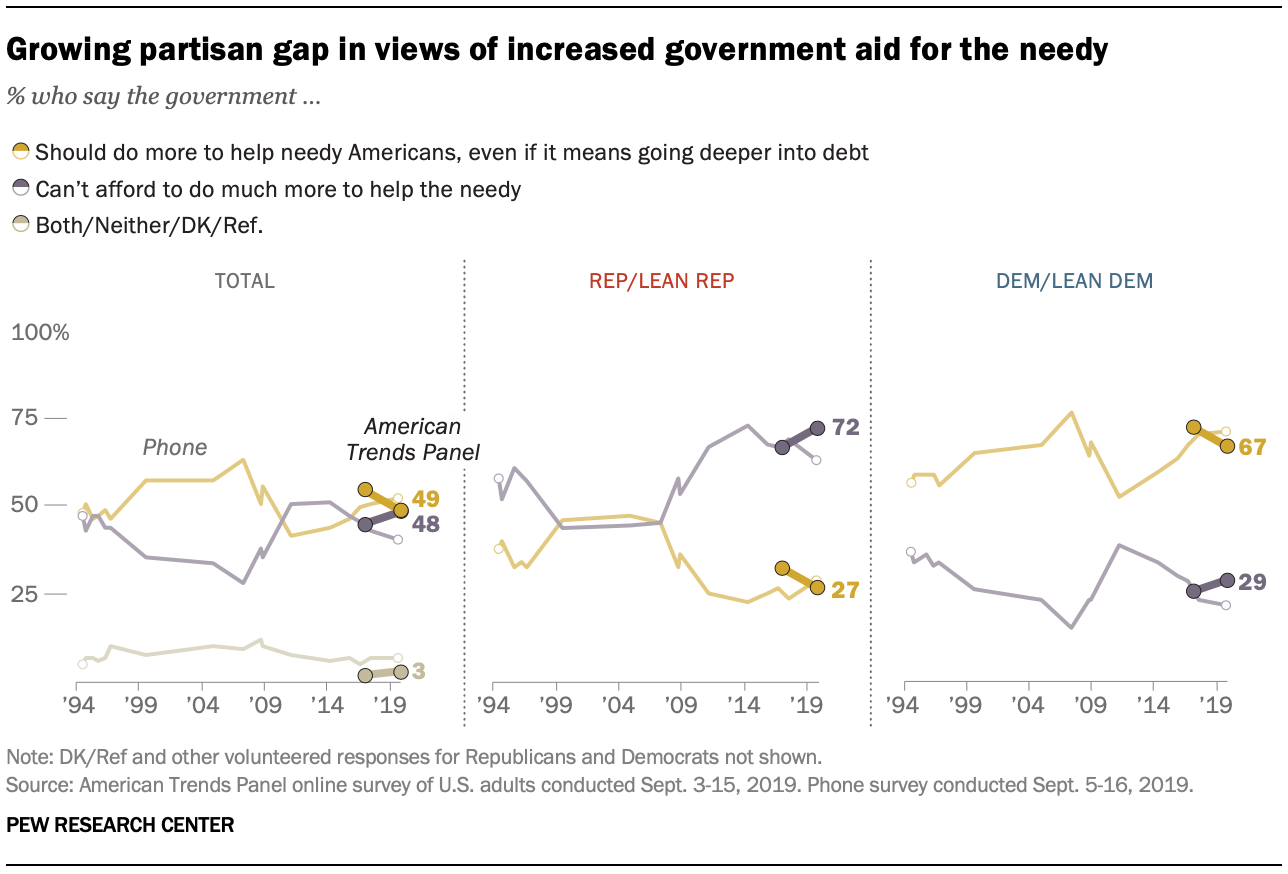
In surveys conducted online and by telephone, majorities say the nation’s economic system unfairly favors powerful interests. However, on the American Trends Panel, 70% say the economic system unfairly favors powerful interests, while 29% say it is generally fair to most Americans. On the phone survey, 60% say the system unfairly favors the powerful, while 37% say it is generally fair.
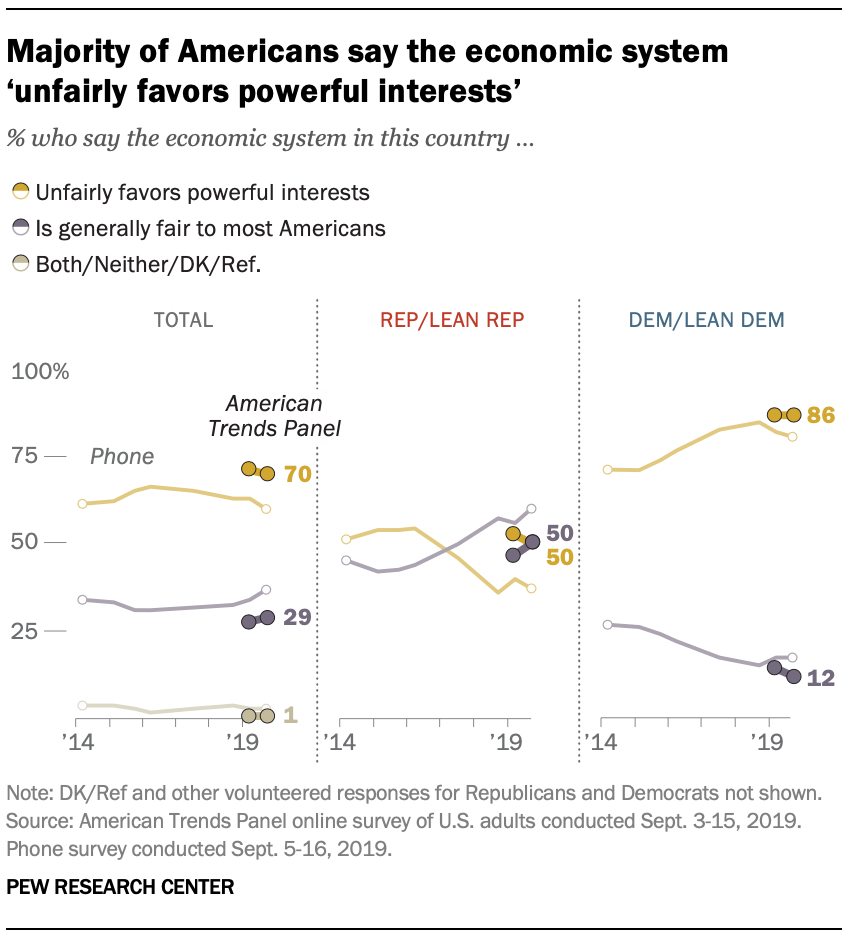
There have long been sizable partisan differences on this question. Republicans are more likely than Democrats to say the economic system is fair. Half of Republicans say this on the online survey (60% on the phone survey); an overwhelming share of Democrats (86% on the ATP, 80% on the phone survey) say the system unfairly favors powerful interests.
On the American Trends Panel, nearly twice as many say that business corporations make too much profit (65%) as say most corporations make a fair and reasonable profit (33%). On the phone survey, 56% say corporations make too much profit, while 38% say profits for most corporations are fair and reasonable.
Online, nearly half of Republicans (48%) say corporations make too much profit; 36% express this view on the phone survey. Majorities of Democrats on the ATP survey (80%) and by phone (73%) say business corporations make too much profit.
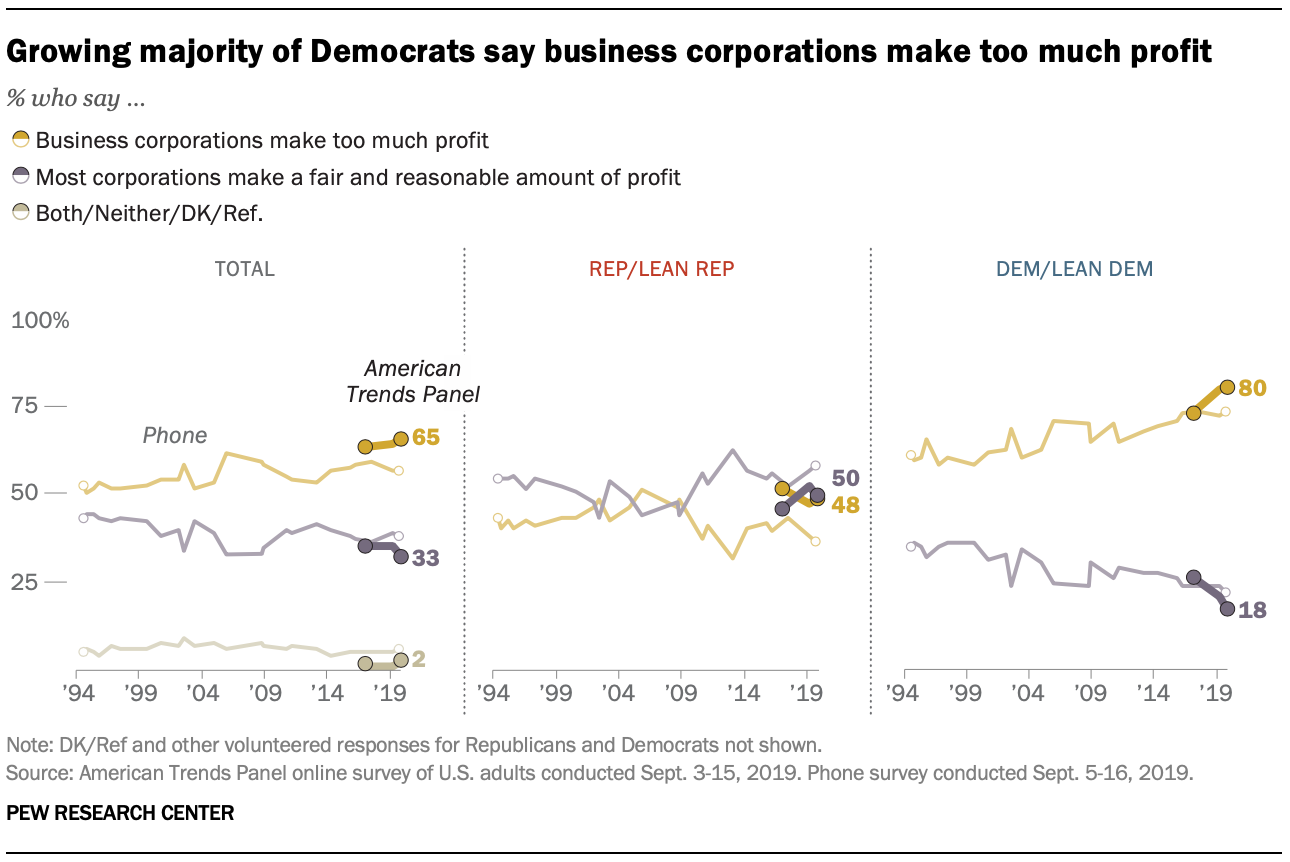
For more than two decades, majorities of Americans have said that most people can get ahead if they are willing to work hard; fewer have expressed the view that hard work is no guarantee of success for most.
On the current online survey, 60% say most people can succeed through hard work, while 39% say hard work is no guarantee of success. On the telephone survey, 65% say hard work leads to success; 32% say hard work does not necessarily ensure success.
Consistent majorities of Republicans (78% on the ATP) say that hard work leads to success for most people. Democrats have long been less likely to express this view: 45% say this in the online survey.
